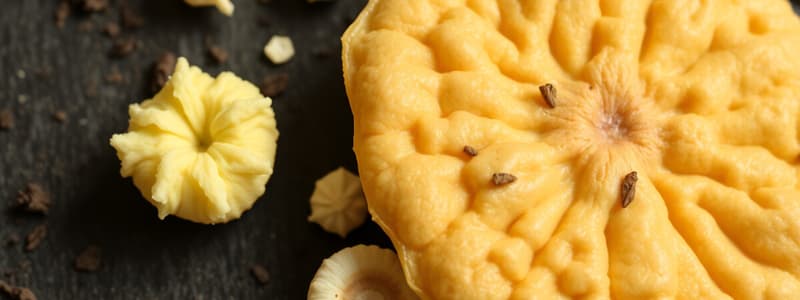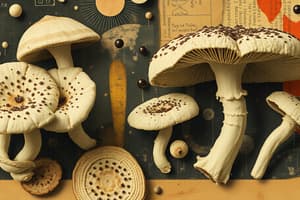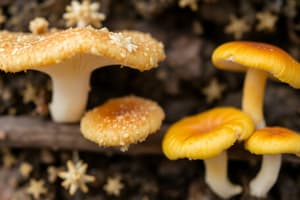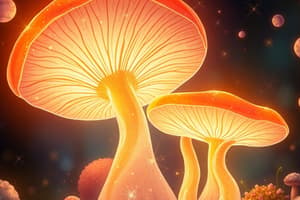Podcast
Questions and Answers
What type of cellular organization do yeasts exhibit?
What type of cellular organization do yeasts exhibit?
- Unicellular (correct)
- Polycellular
- Multicellular
- Aggregated
What is a key feature that differentiates yeasts from true fungi?
What is a key feature that differentiates yeasts from true fungi?
- They do not form spores (correct)
- They exhibit multicellular structures
- They have true hyphae
- They are primarily aquatic
Which of the following health risks is associated with yeasts?
Which of the following health risks is associated with yeasts?
- Skin irritations
- Respiratory problems
- Infections in immunocompromised individuals (correct)
- Allergic reactions
In what oxygen conditions can yeasts grow?
In what oxygen conditions can yeasts grow?
What structural form do fungi take when they exist as mould?
What structural form do fungi take when they exist as mould?
What type of reproduction is common in yeasts?
What type of reproduction is common in yeasts?
Which of the following colours is typically associated with mould?
Which of the following colours is typically associated with mould?
Where is the most significant location for Candida in the human body?
Where is the most significant location for Candida in the human body?
What is the characteristic structure of a mould colony?
What is the characteristic structure of a mould colony?
What type of habitat do moulds typically thrive in?
What type of habitat do moulds typically thrive in?
Flashcards
Fungal Forms: Yeast and Mould
Fungal Forms: Yeast and Mould
Fungi exist in two forms - yeast and mould, both play a role in dental health.
Yeast - Single-celled Fungi
Yeast - Single-celled Fungi
Unicellular fungi that can grow in various environments, including the mouth and stomach.
Yeast Reproduction: Budding and Pseudohyphae
Yeast Reproduction: Budding and Pseudohyphae
Yeast reproduce by budding, forming chains of elongated cells called pseudohyphae, commonly found in the oral cavity.
Mould - Multicellular Fungi
Mould - Multicellular Fungi
Signup and view all the flashcards
Hyphae: The Building Blocks of Mould
Hyphae: The Building Blocks of Mould
Signup and view all the flashcards
Mould Reproduction: Spores
Mould Reproduction: Spores
Signup and view all the flashcards
Candida: Oral Yeast
Candida: Oral Yeast
Signup and view all the flashcards
Oral Commensal Bacteria: Streptococci and Actinomyces
Oral Commensal Bacteria: Streptococci and Actinomyces
Signup and view all the flashcards
Skin Commensal Bacteria
Skin Commensal Bacteria
Signup and view all the flashcards
Nasopharyngeal Commensal Bacteria
Nasopharyngeal Commensal Bacteria
Signup and view all the flashcards
Study Notes
Yeast Characteristics
- Cell Type: Unicellular
- Form: Large single cells
- Habitat: Common on fruit, mammal stomachs, oral cavities, and vaginal areas.
- Appearance: White, thready, typically oval.
- Hyphae: Lack true hyphae; instead, form pseudo-hyphae (multicellular structures).
- Spores: Not a sporing species of fungi
- Colour: Less colorful (typically colorless) but some yellow/creamy when clustered.
- Oxygen Requirements: Can grow in aerobic and anaerobic conditions.
- Health Risks: Infections in immunocompromised individuals.
- Reproduction: Budding (daughter cells split off from mother cell) or binary fission.
Mould Characteristics
- Cell Type: Multicellular
- Form: Grow as multiple tubular branches
- Habitat: Damp, dark, or humid areas.
- Appearance: Fluffy, various shapes.
- Hyphae: Microscopic filaments.
- Spores: A sporing fungus.
- Colour: Diverse (orange, green, black, brown, pink, purple).
- Oxygen Requirements: Only aerobic conditions
- Health Risks: Allergic reactions and respiratory problems
Fungal Structure and Forms
- Eukaryotic: Yeast and mould are eukaryotes.
- Dimorphic: Some fungi can exist as both yeast and mould.
- Candida: A significant type of yeast relevant to dentistry.
- Yeast: Often has lateral projections (daughter cells) and buds (splits off to produce next generation) to reproduce
- Mould: Composed of multicellular threads called hyphae that form a mycelium (mass of hyphae forming a mould colony.)
Fungal Commensal Flora Locations
- Gastrointestinal Tract: Primarily in the lumen, but also on epithelial cells and in lymphoid tissues
- Oral Cavity: Over 500 bacterial species, including streptococci and Actinomyces.
- Skin: Found on the skin surface.
- Nasopharynx: Found in the nasopharyngeal cavity.
- Genital Tract: On mucosal surfaces.
Studying That Suits You
Use AI to generate personalized quizzes and flashcards to suit your learning preferences.



